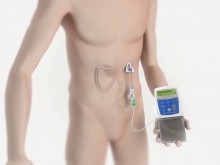- It is estimated that 150,000 people have been affected in Spain (PD), a figure expected to increase due to the aging of the population.
- In Alicante, 10% of patients are diagnosed with advanced Parkinson's disease.
The neurology unit of the hospital IMED Levante fit just this week on one of his patients an effective treatment for people with advanced stages of Parkinson's disease.
This option in addressing Parkinson's drug policy Duodopa (continuous intraduodenal infusion of levodopa / carbidopa), through an infusion that makes it possible that the substance may be released continiously, in favor of a personalized treatment. Thanks to its innovative gel formulation, this drug achieves greater stability of the patient, which reduces the motor and non-motor symptoms of the disease, resulting in a better quality of life and autonomy.
The head of the neurology department in IMED Levante Hospital, Dr. Alejandro Garcia Escriva, explaines that "the implementation of this treatment is a major advance for patients suffering from this disease, since route of administration provides a constact effect during the whole time."
Symptoms of Parkinson's disease is carried out as the years pass, and which can be turned off. Dr. Garcia Escrivá said that "in the most advanced stages reduce the available treatments and oral medications. Therefore it is necessary to apply the use of advanced therapies, hence the importance of the application of this therapeutic option."
Moreover, while Parkinson's disease progresses, the patient loses autonomy, and is increasingly depending on a caregiver, who are forced to leave in his daily life activities. In these phases the benefits of advanced treatments give positive impact on the quality of life of patients and caregivers, and that gives the patient greater autonomy.
On Parkinson's disease
Parkinson's disease (PD) is a neurodegenerative disorder of the central nervous system that affects the area to coordinate activities and the muscle tone and movement. It is estimated that it affects 150,000 people in Spain, a figure expected to increase due to the aging of the population. This neurodegenerative disease, the second most common cause is unknown and has chronic and progressive courses.
PE occurs when cells in the brain region called "black substance", stop working and die. These cells are responsible for the production of a substance called dopamine. Dopamine is a neurotransmitter or chemical messenger which transmits information on regions of the brains that control movement, and coordination. In Parkinson's patients, the dopamine-producing cells begin to die, so that the neurotransmitter in certain brain structures reduces.
As the disease progresses, conventional drugs loose effectiveness, and is it necessary to use advanced therapies (deep brain stimulation of the subthalamic nucleus or continuous infusions of levodopa or apomorphine). The benefits of this therapy have a positive influence on the quality of life of patients.


